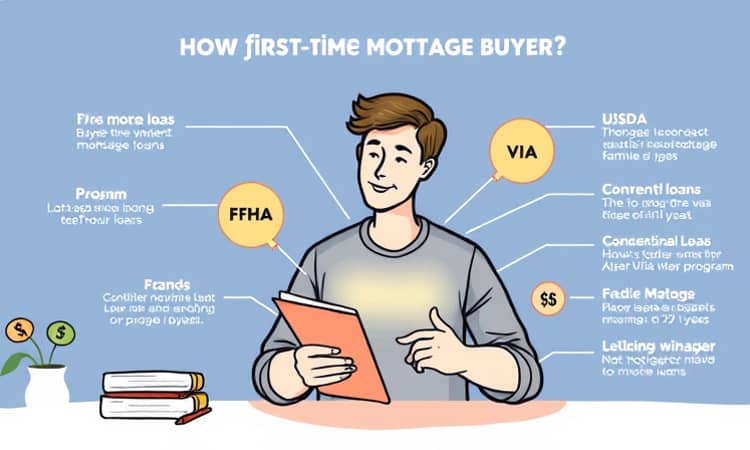As a first-time homebuyer, navigating the world of mortgages can be overwhelming. With numerous options available, it's essential to understand the various types of loans and how they can benefit you. Whether you are looking for favorable terms, lower down payments, or special benefits for certain groups, this guide will delve into the best loan options designed specifically for first-time homebuyers.
FHA loans, VA loans, USDA loans, conventional loans, along with Freddie Mac and Fannie Mae programs, all have distinct advantages that can make homeownership a reality for many. With knowledge of these options, you can make informed decisions, streamline your loan process, and save money in the long run.
Let's explore these various loan types to help you identify the right choice for your first home purchase.
1. Federal Housing Administration (FHA) Loans

FHA loans are a popular choice for first-time homebuyers due to their flexibility and lenient credit requirements. With a minimum down payment of just 3.5%, FHA loans have made homeownership accessible to many who might otherwise struggle to save for a substantial down payment.
In addition to the low down payment, FHA loans allow for lower credit scores compared to conventional loans, making it easier for borrowers who are new to the credit system or have had past financial difficulties. This type of loan is backed by the government, which helps lenders offer better terms to buyers.
- Minimum 3.5% down payment
- Lower credit score requirements
- Mortgage insurance is required
- Allows for gift funds to be used towards down payment
Overall, FHA loans present a viable path for individuals aiming to make their first foray into homeownership with manageable financial responsibilities.
Who Qualifies?
To qualify for an FHA loan, borrowers need to demonstrate a steady employment history, preferably with at least two years in the same field. Additionally, lenders typically look for a credit score of 580 or higher for the minimum down payment, although some may consider scores as low as 500 with a higher down payment of 10%.
Debt-to-income (DTI) ratios also come into play, generally, your total monthly debts should not exceed 43% of your total gross monthly income. This ensures that you can manage monthly payments effectively.
2. Veterans Affairs (VA) Loans

VA loans are particularly designed for active and retired military personnel and their eligible family members. These loans are a fantastic option for first-time homebuyers in the military as they come with zero down payment and favorable interest rates, which can be life-changing when budgeting for a new home.
Additionally, VA loans are backed by the government, offering an extra layer of security for lenders. This allows them to provide better terms and also eliminates the need for private mortgage insurance (PMI), which can add significant costs to monthly payments.
- No down payment required
- No PMI requirement
- Lower mortgage rates
- Flexible credit requirements
With the unique benefits that VA loans offer, they provide military families with an opportunity to achieve homeownership without the typical financial restraints often faced by first-time buyers.
Who Qualifies?
To qualify for a VA loan, you must have served in the military, be an active-duty member, or be a qualifying spouse of someone who has served. The amount of service needed to qualify can vary, but applicants must provide a Certificate of Eligibility (COE) from the VA to prove their eligibility.
In addition to service requirements, lenders will typically review the applicant’s credit history and DTI ratios, ensuring that borrowers are capable of managing their mortgage payments responsibly.
3. U.S. Department of Agriculture (USDA) Loans

USDA loans are an excellent option for homebuyers looking to purchase in designated rural areas. These loans are designed to promote homeownership in less densely populated regions, making them perfect for individuals who are willing to move outside urban centers for affordable living.
One key benefit of USDA loans is the opportunity for 100% financing, meaning first-time buyers may not be required to make a down payment. Additionally, this type of financing often comes with lower mortgage rates and favorable terms, which can greatly assist those on a tight budget.
The program also targets low-to-moderate income families, providing assistance where it's needed the most, further opening the doors to homeownership.
Who Qualifies?
To qualify for a USDA loan, homebuyers must meet specific income guidelines, typically not exceeding 115% of the median income for the area. The property must also reside in a qualified rural area as defined by the USDA.
At a minimum, borrowers need a credit score of 640. This requirement underscores the importance of maintaining a solid credit history, although certain exceptions may arise for those who can demonstrate exceptional extenuating circumstances.
- Must have a qualifying income within the designated limits
- Must purchase in an eligible rural area
- Must have a credit score of 640 or above
These criteria help ensure that USDA loans fulfill their goal of supporting homebuyers in rural regions, allowing them to achieve financial stability through homeownership.
4. Conventional Loans

Conventional loans are not backed by a government agency, which means they may come with stricter requirements than FHA or VA loans. They typically require a higher credit score and a larger down payment, although options do exist for lower down payments under certain conditions. Conventional loans can be ideal for buyers who have a strong financial profile and can afford to make larger initial payments.
One thing to consider when applying for a conventional loan is the private mortgage insurance (PMI) requirement for down payments lower than 20%. PMI protects the lender if the borrower defaults on the loan, leading to an added monthly cost for the buyer.
Who Qualifies?
To qualify for a conventional loan, borrowers generally need a credit score of 620 or higher. Lenders will also assess DTI ratios and overall financial stability, with the lower the DTI being more favorable for the borrower.
A typical criterion involves a down payment of either 3% or 20%, depending on market conditions and institutional requirements, which also significantly influences the terms of the loan.
- Minimum credit score of 620
- A down payment of at least 3%
- Debt-to-income ratio guidelines
By fulfilling these requirements, buyers may secure competitive loan terms that suit their financial situation, fostering their journey toward homeownership.
5. Freddie Mac Home Possible and Fannie Mae HomeReady Programs

Both Freddie Mac and Fannie Mae offer special loan programs designed for low-to-moderate income buyers. These programs feature flexible underwriting and lower down payment options, making them very accessible for first-time homebuyers who may struggle to save up a large down payment.
Both programs allow for down payments as low as 3%, making it easier to enter the housing market. They also accept a wider range of income sources, including rental income or income from non-borrower household members, providing more opportunities for eligible applicants.
Who Qualifies?
Eligibility criteria for these programs include a minimum credit score generally between 620 and 640, depending on the lender. Additionally, the household income should typically not exceed 80% of the area median income, emphasizing the programs' focus on helping those with lower incomes achieve homeownership.
Borrowers must also take a homeownership education course, preparing them for the responsibilities of owning a home, which enhances their chances for success and stability.
- Minimum credit score of 620-640
- Household income must be below 80% of AMI
- Completion of a homeownership education course
These added benefits and requirements ensure that first-time buyers are well-equipped to handle their new responsibilities as homeowners.
How to Choose the Right Loan

Choosing the right loan involves carefully considering your financial situation and long-term goals. Evaluate your income, savings for a down payment, credit history, and how long you plan to stay in your new home. By understanding your personal circumstances, you can identify which loan products would serve you best.
Another factor to consider is the total loan costs, including interest rates, monthly payments, and additional fees. Some loans might offer lower down payments at a higher interest rate, while others might require no PMI but necessitate a hefty down payment. Balancing upfront costs with long-term financial commitments is essential when making this important decision.
Utilizing a mortgage calculator can help estimate potential monthly payments, allowing you to visualize different loan scenarios and discover what fits comfortably within your budget.
- Assess your financial situation and future plans
- Compare interest rates and loan terms
- Consider using a mortgage calculator
By weighing these factors thoughtfully, you can make an informed decision that aligns with your unique needs and financial goals.
Conclusion

For first-time homebuyers, understanding your loan options is crucial to making confident decisions in the housing market. Each loan type offers unique features, benefits, and potential drawbacks that may serve different needs based on individual financial situations and goals.
As you navigate through the maze of options, remember to evaluate terms carefully, determine qualifying criteria, and consider how each loan type fits into your broader financial picture. By doing so, you can find a suitable path to homeownership that aligns with your needs and aspirations.
Take the time to research, assess your circumstances, and utilize available resources, including reaching out to trusted lenders, to ensure you select the most appropriate financing solution.














